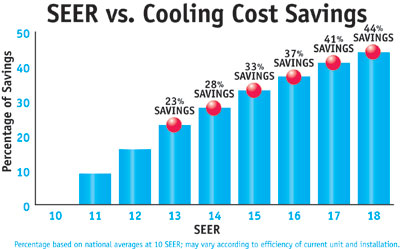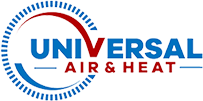Tag: Energy Efficiency Ratings
22 Energy Saving Tips To Save You Money
Little changes that can add up to big savings on your annual cooling costs

- Use ceiling fans to cool off for less. Ceiling fans use no more electricity than a standard light
bulb. However, be sure to turn fans off when you leave the room. - Switch your ceiling fan to turn in a counter-clockwise direction In the summer; in the winter, run it at low speed, but clockwise.
- Cool your home at 78 degrees or higher with the thermostat fan switched to auto. For additional savings, raise your thermostat to 82 degrees or higher when you’re away.
- Install a programmable thermostat to adjust your temperature during the day.
- Close your exterior doors and windows tightly when the AC is on. Save even more by turning off kitchen and bath exhaust fans.
- Window tinting can help reduce room temperature in rooms that have a sunny exposure. Especially a south west exposure in late afternoon when the outside temperature is at its highest.
- Clean or replace the A/C filter at least once per month to help your unit run more efficiently and trim cooling costs.
- Consider purchasing an lifetime electrostatic air filter. It will do a better job of keeping your coil clean and trap allergens better than the thick hypoallergenic disposable air filters that restrict air flow.
- If you have an older air conditioner with a SEER rating of under 16, consider upgrading to a higher efficiency model. Not only will your AC be more efficient, you could also be eligible for a utility company rebate and Energy Star Federal Tax Credit. The higher the SEER rating, the more your will save. Consider a two stage or multi-stage AC unit for even more saving.
- If you have a manual thermostat be sure the fan switch is set to “auto” to save energy. Leaving it in the “on” position keeps air running constantly.
- Block the sun from overheating your home! Inside, use shades, blinds and drapes. Outside, use awnings, trees and shrubs..
- Get a AC tune-up. Running an inefficient AC system can result in high monthly bills.
- Open interior doors so that cooled air flows freely throughout your home.
- Repair leaky ducts to reduce heating and cooling costs.
- Install attic insulation to reduce high home cooling costs up to 20%. You’ll save money each month and may qualify for a rebate.
- Check for household leaks to make sure air isn’t escaping through openings such as fireplace dampers, doors and windows. Make sure your weatherstripping is not allowing air to escape. If it is, replace it.
- Decorate for a cooler home by hanging light-colored curtains that allow light to enter a room while blocking some of the sun’s rays, and light-colored paint to reflect heat.
- Close unused air vents. If you have central AC you can close air vent and doors in rooms you’re not using so you’re not paying to cool them.
- Plant trees to provide shade on the sunny side of your home. Use large potted plants that can provide adequate shade (Ficus Trees) if you have a patio apartment.
- Install more ceiling fans. Because the breeze of a fan can make you feel three to four degrees cooler, you can raise that thermostat and still stay comfortable.
- When you have your roof replaced, go with a lighter color. The more reflective the color the lower your attic temperature. One study showed a 20 degree temperature difference in the attic when the homeowner changed from dark grey roof tiles to white.
- Have your AC system evaporator coils cleaned, if needed. Restricted air flow will not only cause your air conditioning unit to freeze up, it will impact your cooling costs. An air conditioner with restricted air flow causes your air conditioner to work much harder and can potentially damage your air conditioner and reduce its lifespan.
Your comfort is our top priory.
Universal air and Heat is dedicated to providing the best air conditioning repair and installation service from South Florida to Tampa, Florida. We have become a leader in the air conditioning industry by consistently delivering outstanding customer service.
We offer Free AC System Estimates and Free Service calls ($49 value) with repair.
Call Universal Air and Heat for all of your air conditioning and indoor air quality needs.
Energy Efficiency Ratings
How Energy Efficiency Ratings Affect Savings
Energy-efficient heating and cooling products make home comfort more affordable. Understanding efficiency ratings is an important first step in choosing the system that’s right for you. Let’s decipher the standards used to measure the efficiency of furnaces, air conditioners and heat pumps, and how they impact your monthly utility bill:
Furnaces: If you have an older furnace, you could save considerably on your heating bill by upgrading to a higher-efficiency model – start by checking out the AFUE rating.
AFUE (Annual Fuel Utilization Efficiency)
Standard measurement of efficiency for gas and oil-fired furnaces
Tells you how much of your fuel is used to heat your home and how much is wasted
The higher the rating, the greater the efficiency
Minimum required rating is 78%
Many manufacturers offer a full line of furnaces with AFUE ratings of up to 98.3%
Air Conditioners and Heat Pumps: Upgrading to high-efficiency heat pumps and air conditioners requires an initial investment, but you’ll quickly see payback in the form of lower, annual utility bills for the life of your system. To compare the efficiency of these products, look for two numbers –SEER rating for cooling, and if you’re considering a heat pump, HSPF for heating.
SEER (Seasonal Energy Efficiency Ratio)
Standard measurement of efficiency for the cooling process of air conditioners and heat pumps
The higher the number, the greater the efficiency
Minimum required SEER rating is 13
Many manufacturers of residential cooling systems have units with SEER ratings of up to 20.5
HSPF (Heating Seasonal Performance Factor)
Standard measurement of the efficiency of the heating mode of heat pumps
The higher the number, the greater the efficiency
Minimum required HSPF rating is 7.7
Many manufacturers of residential heating and cooling systems make heat pumps with HSPF ratings from up to
13.0

Matching Your System for Optimum Efficiency
An additional factor that affects the efficiency of your system is your indoor coil (also called an evaporator coil). In order to maximize SEER and HSPF ratings and ensure proper performance, your air conditioner or heat pump unit must be matched with the correct indoor coil. When you replace an existing system, make sure you consider replacing the indoor coil so you get the most efficient performance.
Universal air and Heat only sells and installs matched heating and cooling system components in accordance with manufacturer specifications.
Call for a Free “no obligation” AC System Estimate 866-999-2556 (COOL)
Or schedule online today!







